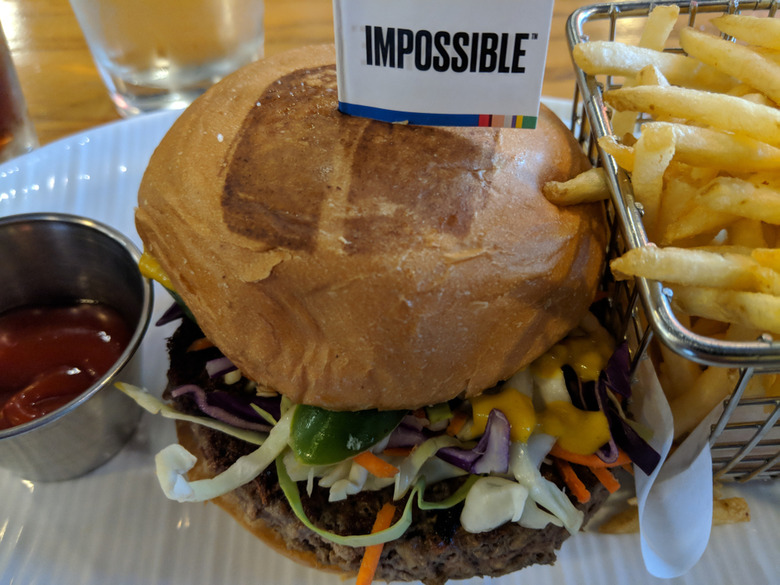The Vegan Impossible Burger Looks Just Like Meat, But Is It OK To Eat?
The famed Impossible Burger is a vegan hamburger substitute so realistic it actually bleeds. It's made of plant-based products, but it looks and reportedly tastes so much like a real burger that it's won spots on the menus of Umami Burger and David Chang's Momofuku Nishi restaurant. It's a technological marvel that's being embraced by chefs and restaurateurs. But is it actually safe to eat?
One of the things that makes the Impossible Burger different from other vegan hamburger substitutes is that it is so meat-like it actually "bleeds." Stanford University biochemist Patrick Brown says the key to making a burger taste like a burger is a compound called heme. Heme is what makes blood look red, and it's also a key component to the flavor of meat. Some plants have heme too, though, and the Impossible Burger uses heme that occurs naturally in the roots of soybean plants to give its product that meat-like look and flavor.
According to the New York Times, the heme in Impossible Burgers comes from soy leghemoglobin. That occurs naturally in the roots of soybean plants, but Impossible Burger makes their soy leghemoglobin in a lab. Impossible Foods had asked the FDA to review their research and declare that Impossible Burgers are safe for people to eat. But the FDA is withholding that judgment because the agency says it can't declare conclusively that Impossible Burger is safe for human consumption.
According to the FDA report, the Impossible Burger's lab-created soy leghemoglobin has not been tested thoroughly enough to confirm that it is not a potential allergen. Impossible Foods says its product is 100-percent safe and has been extensively tested.
"FDA believes the arguments presented, individually and collectively, do not establish the safety of soy leghemoglobin for consumption," FDA officials wrote in a memo, according to the New York Times, "nor do they point to a general recognition of safety."
Impossible Foods says it has done extensive studies in rats and submitted research indicating that scientists say its soy leghemoglobin is the same as the naturally occurring leghemoglobin people already eat in plants and animals.
In a response to the New York Times article, Impossible Foods issued a statement that said, "The heme in the Impossible Burger is atom-for-atom identical to the heme found in meat, fish, plants and other foods."
Impossible Foods maintains that its product is completely safe and has been proved to be so.
"Soy leghemoglobin has been extensively analyzed in rigorous safety tests by the world's leading experts on food safety and allergenicity–and those experts have repeatedly concluded that it's safe to eat," the company said.
Impossible Foods does not actually need FDA approval to sell the burgers. It did not even have to ask the FDA for approval. The FDA could, however, force Impossible Foods to stop selling the burgers if it really felt the burgers could be unsafe. So far it has not done so.
